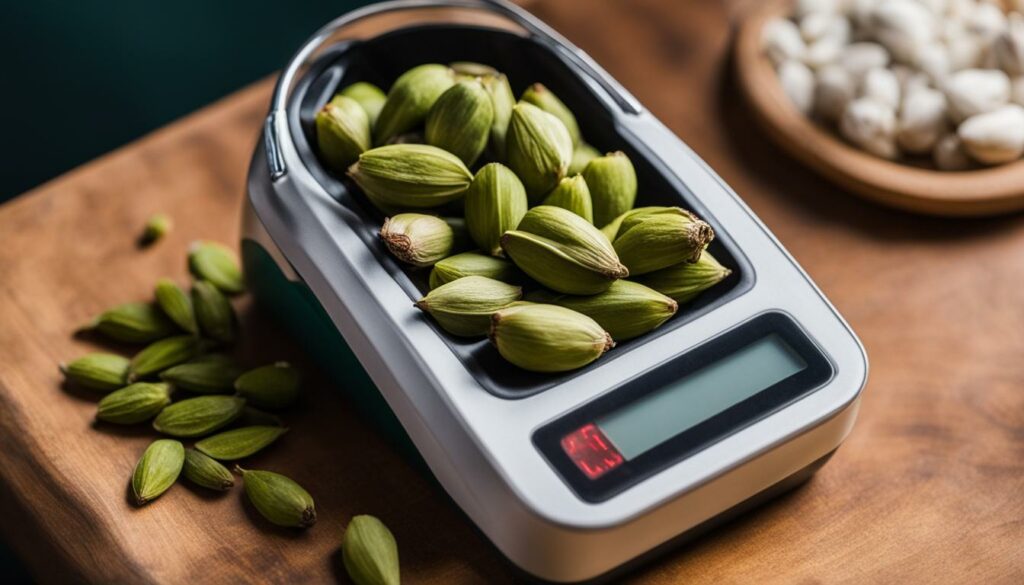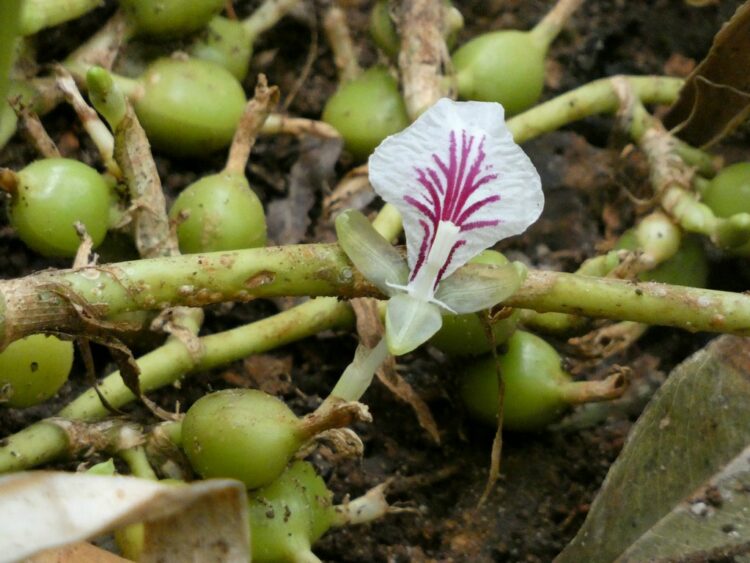Cardamom is not just a flavorful spice; it also holds numerous potential health benefits. With its sweet and slightly minty taste, cardamom has been used in herbal medicine for centuries.
Research has shown that this versatile spice possesses antioxidant and diuretic properties, which may contribute to lower blood pressure. Cardamom also contains compounds that exhibit cancer-fighting abilities and anti-inflammatory effects, offering protection against chronic diseases.
Additionally, it has been used to aid digestion, promote weight loss, support respiratory health, and maintain a healthy heart. Let’s explore the impressive healing properties of cardamom!
Key Takeaways:
- Cardamom is a spice with sweet and minty flavors, known for its medicinal properties.
- Studies suggest that cardamom may help lower blood pressure due to its antioxidant levels and diuretic effect.
- Cardamom has shown promising potential in fighting cancer cells and enhancing the immune system.
- Its anti-inflammatory effects and high antioxidant compounds make cardamom beneficial for preventing chronic diseases.
- Cardamom can aid digestion, promote weight loss, support respiratory health, and maintain heart health.
Lower Blood Pressure with Cardamom
Cardamom, the aromatic spice with a sweet and minty flavor, offers more than just a delightful addition to your favorite dishes. Studies have shown that cardamom may have beneficial effects on blood pressure, making it a potential natural remedy for managing high blood pressure.
A study conducted on adults with high blood pressure found that consuming three grams of cardamom powder daily for 12 weeks resulted in a significant reduction in blood pressure levels.
This promising result suggests that incorporating cardamom into your diet may help regulate blood pressure in individuals with hypertension.
The ability of cardamom to lower blood pressure can be attributed to its various properties, such as its antioxidant content and diuretic effect.
Antioxidant Properties: Cardamom contains high levels of antioxidants, which are beneficial compounds that help protect against cell damage caused by harmful free radicals. These antioxidants may play a role in reducing blood pressure by promoting overall cardiovascular health.
Diuretic Effect: Cardamom has a natural diuretic effect, meaning it helps promote urine production and eliminate excess water from the body. By increasing urine output, cardamom may assist in reducing fluid retention and lowering blood pressure.
By harnessing the power of cardamom’s antioxidant properties and diuretic effect, you can potentially support healthy blood pressure levels and promote overall cardiovascular wellness.
| Benefits of Cardamom for Lowering Blood Pressure: |
|---|
| Reduces blood pressure in individuals with hypertension |
| Provides antioxidant benefits for overall cardiovascular health |
| Promotes urine production and eliminates excess water |
It’s important to note that while cardamom shows promise as a natural remedy for managing high blood pressure, it should not replace prescribed medications or medical advice. Always consult with a healthcare professional before making any significant changes to your diet or treatment plan.
Next, we’ll explore how cardamom’s cancer-fighting compounds can offer potential benefits in the prevention and treatment of various types of cancer.

Fight Cancer with Cardamom
Cardamom has shown promising potential in fighting cancer cells. Studies conducted on mice have revealed that cardamom powder contains cancer-fighting compounds, such as phenolic acids and flavonoids, which increase the activity of enzymes that fight against cancerous cells.
Additionally, cardamom has been found to enhance the ability of natural killer cells to target and destroy tumors.
In a study, mice that were fed a diet supplemented with cardamom showed a significantly lower incidence of cancer compared to the control group. This suggests that cardamom could potentially be used for cancer prevention.
In another study conducted on oral cancer cells, cardamom was shown to inhibit their growth in test tubes, further highlighting its potential anti-cancer properties.
Although these results are promising, it’s essential to note that more research is needed to determine if these findings apply to humans. Clinical trials are necessary to understand the effectiveness of cardamom in preventing and treating cancer in human subjects.
Nevertheless, the current studies provide valuable insights into the potential role of cardamom in combating tumorous growth.
By incorporating cardamom into your diet, you can potentially harness its cancer-fighting properties. Whether used in spice blends, tea, or even desserts, cardamom offers a flavorful and aromatic addition to your meals while potentially contributing to your overall health and well-being.
Cancer-Fighting Compounds in Cardamom
Cardamom contains various bioactive compounds, including:
| Compound | Function |
|---|---|
| Phenolic acids | Exhibit antioxidant properties and may help prevent cancer development. (source) |
| Flavonoids | Have potential anti-cancer effects and can enhance the activity of enzymes that fight cancer. (source) |
These compounds work together to potentially inhibit tumorous growth and support the body’s natural defenses against cancer cells. While more research is needed to fully understand the mechanisms behind cardamom’s cancer-fighting properties, the initial findings are encouraging.
Protect Against Inflammation and Chronic Diseases
Inflammation is a major contributor to chronic diseases, and cardamom has been found to have anti-inflammatory effects. Its antioxidant compounds protect cells from damage and help prevent inflammation.
Studies have shown that cardamom extract can inhibit various inflammatory compounds in rats and reduce liver inflammation induced by a high-carb and high-fat diet.
Cardamom’s anti-inflammatory effects make it a potential natural remedy for conditions associated with chronic inflammation, such as cardiovascular disease, diabetes, and certain types of cancer. By reducing inflammation, cardamom may help prevent or manage these conditions.
One study conducted on rats with inflamed livers found that cardamom extract significantly reduced markers of inflammation and improved liver function. The rats treated with cardamom also showed a decrease in markers of oxidative stress, indicating the antioxidant properties of cardamom.
Though human studies are limited, there is evidence to suggest that cardamom may help increase antioxidant status. Cardamom supplements have been found to increase antioxidant levels by up to 90% in some studies, which can help protect against cell damage caused by oxidative stress and inflammation.
Cardamom for Inflammation Prevention
Cardamom’s role in inflammation prevention extends beyond its antioxidant effects. Some compounds found in cardamom have been shown to inhibit the production of inflammatory molecules in the body. These molecules, such as interleukins and tumor necrosis factor-alpha, contribute to the development of chronic inflammation.
One compound in cardamom, called cineole, has been found to have anti-inflammatory properties. It may suppress the activation of certain inflammatory enzymes and reduce the production of pro-inflammatory molecules. In one study, cardamom extract was shown to inhibit the release of inflammatory compounds in human cells.
Furthermore, cardamom contains other bioactive compounds that have the potential to modulate the immune system and reduce inflammation. For example, cardamom has been found to increase the activity of natural killer cells, which play a crucial role in killing infected and cancerous cells in the body.
Overall, the anti-inflammatory effects of cardamom and its potential to protect against chronic diseases make it a valuable spice to incorporate into a balanced diet.
Whether consumed as part of a meal or taken as a supplement, cardamom’s unique blend of antioxidants and anti-inflammatory compounds can contribute to overall health and well-being.

| Conditions | Cardamom Benefits |
|---|---|
| Cardiovascular Disease | May help reduce inflammation in blood vessels and improve heart health |
| Diabetes | May help regulate blood sugar levels and reduce inflammation associated with insulin resistance |
| Cancer | Potential to inhibit tumor growth and enhance the activity of immune cells against cancer cells |
| Arthritis | May help reduce joint inflammation and alleviate symptoms |
| Respiratory Conditions | May help improve breathing and reduce inflammation in the respiratory tract |
| Gastrointestinal Disorders | May help alleviate inflammation in the gut and improve digestive health |
Conclusion
Cardamom, a versatile spice known for its sweet and slightly minty flavor, offers a wide range of potential health benefits. With a rich history in traditional medicine and support from scientific research, cardamom has emerged as a promising natural remedy for various health concerns.
The impressive antioxidant, anti-inflammatory, and antibacterial properties of cardamom make it a valuable spice for protecting against chronic diseases and improving overall well-being.
Studies have shown its potential to lower blood pressure, fight cancer cells, improve digestion, freshen breath, treat infections, and even enhance respiratory health.
While cardamom’s impact on blood sugar levels, breathing, and liver health has also been highlighted, further research is necessary to fully harness and understand its healing potential.
Nevertheless, incorporating cardamom as a spice in your daily diet or considering cardamom supplements can provide a natural and flavorful way to enhance your health and enjoy its many benefits.
Discover the power of cardamom and explore its medicinal properties today. From promoting heart health to supporting digestion, this remarkable spice holds the potential to improve your well-being and add a delicious touch to your meals.
FAQ
What are the health benefits of cardamom?
Cardamom has numerous health benefits, including lowering blood pressure, fighting cancer cells, protecting against inflammation and chronic diseases, improving digestion, aiding in weight loss, promoting respiratory health, and supporting heart health. It also has anti-inflammatory and antibacterial properties.
How does cardamom lower blood pressure?
Cardamom contains antioxidant compounds and has a diuretic effect, which promotes urination and helps eliminate excess water from the body. These properties contribute to lowering blood pressure, making cardamom a potential natural remedy for managing high blood pressure.
Can cardamom help in fighting cancer?
Studies have shown that cardamom can potentially fight cancer cells. It increases the activity of enzymes that fight cancer and enhances the ability of natural killer cells to attack tumors. However, further research is needed to determine if these findings apply to humans.
How does cardamom protect against inflammation and chronic diseases?
Cardamom has anti-inflammatory effects due to its antioxidant compounds. These compounds protect cells from damage and help prevent inflammation. Studies have shown that cardamom extract can inhibit various inflammatory compounds and reduce liver inflammation.
Additionally, cardamom supplements can increase antioxidant status, potentially protecting against chronic diseases.
What other health benefits does cardamom offer?
Apart from lowering blood pressure, fighting cancer cells, and protecting against inflammation and chronic diseases, cardamom also improves digestion, aids in weight loss, promotes respiratory health, supports heart health, freshens breath, treats infections, and may improve breathing and blood sugar levels.
However, more research is needed to fully understand and utilize cardamom’s healing properties.




